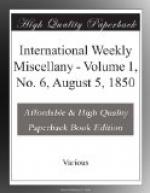“’I cannot sympathize
with such an apprehension; the spectacle
is capable to swallow
up all such objects.”
“It is fearful, too,
to know, as you look, that whatever has
been swallowed by the cataract,
is like to rise suddenly to
light.”
“I took our mutual friends to see her.”
“It was always obvious
that they had nothing in common
between them.”
“The Indian cannot be
looked at truly except by a poetic
eye.”
“McKenny’s Tour
to the Lakes gives some facts not to be met
with elsewhere.”
“There is that mixture
of culture and rudeness in the aspect
of things as gives
a feeling of freedom,” etc., etc.
“These are merely a few, a very few instances, taken at random from among a multitude of willful murders committed by Miss Fuller on the American of President Polk. She uses, too, the word ‘ignore,’ a vulgarity adopted only of late days (and to no good purpose, since there is no necessity for it) from the barbarisms of the law, and makes no scruple of giving the Yankee interpretation to the verbs ‘witness’ and ‘realize,’ to say nothing of ‘use,’ as in the sentence, ‘I used to read a short time at night.’ It will not do to say in defense of such words, that in such senses they may be found in certain dictionaries—in that of Bolles’, for instance;—some kind of ‘authority’ may be found for any kind of vulgarity under the sun.
“In spite of these things, however and of her frequent unjustifiable Carlyleisms, (such as that of writing sentences which are no sentences, since, to be parsed, reference must be had to sentences preceding,) the style of Miss Fuller is one of the very best with which I am acquainted. In general effect, I know no style which surpasses it. It is singularly piquant, vivid, terse, bold, luminous—leaving details out of sight, it is everything that a style need be.
“I believe that Miss Fuller has written much poetry, although she has published little. That little is tainted with the affectation of the transcendentalists, (I used this term, of course, in the sense which the public of late days seem resolved to give it,) but is brimful of the poetic sentiment. Here, for example, is something in Coleridge’s manner, of which the author of ‘Genevieve’ might have had no reason to be ashamed:—
A maiden sat beneath a tree;
Tear-bedewed her pale cheeks be,
And she sighed heavily.
From forth the wood into the light
A hunter strides with carol light
And a glance so bold and bright.
He careless stopped and eyed the maid;
‘Why weepest thou?’ he gently
said;
‘I love thee well, be not afraid.’
He takes her hand and leads her on—
She should have waited there alone,
For he was not her chosen one.




